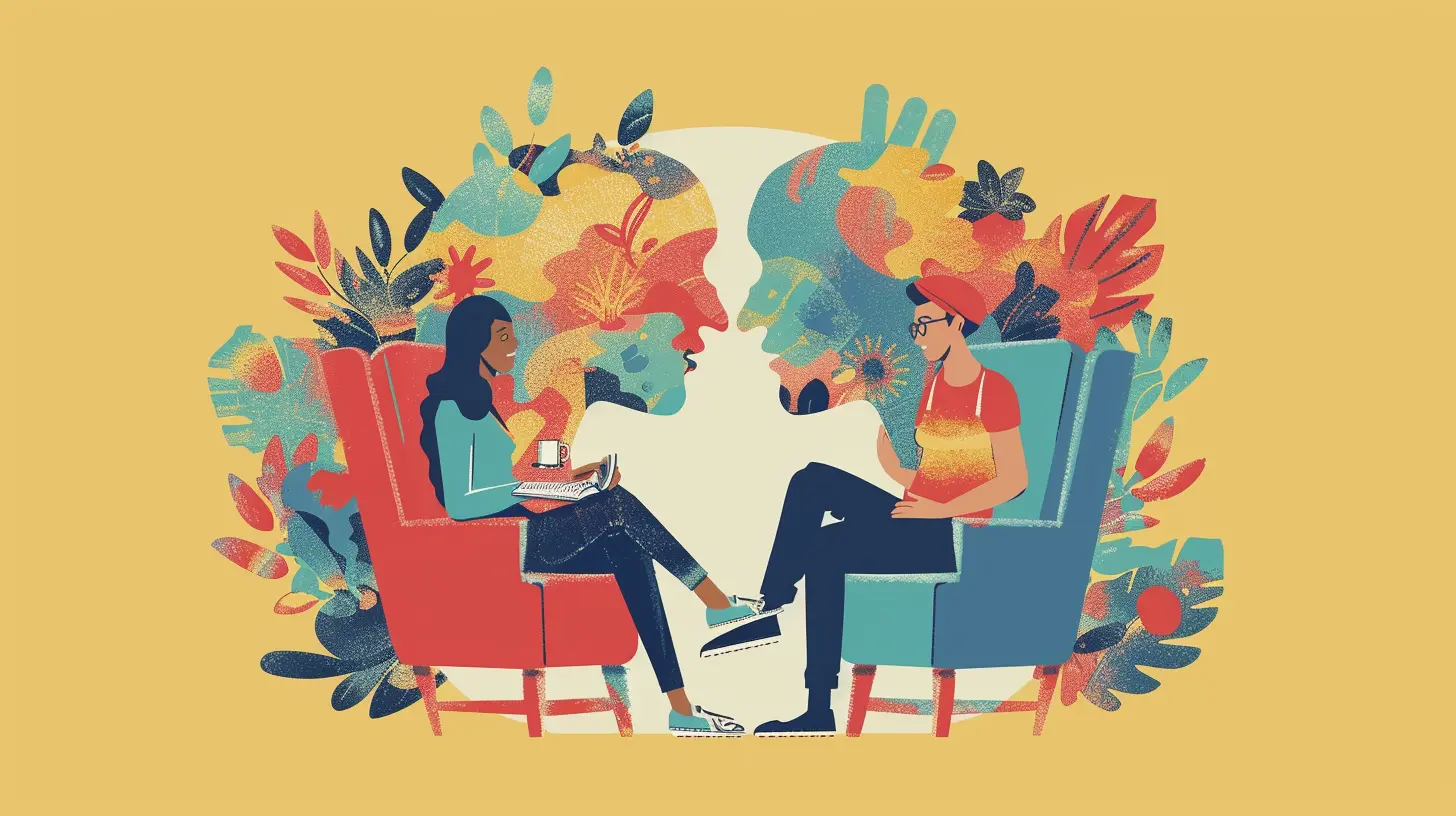Breaking Down Common Myths About Psychotherapy
24 September 2025
Let’s be real—when you hear the word “therapy,” what pops into your head? A couch? A serious-looking person with a notepad? Maybe someone crying into a tissue box while talking about their childhood?
You’re not alone. Psychotherapy tends to have a bunch of baggage attached to it—but not the helpful kind. We're talking about myths. Misunderstandings. Total misconceptions. And these myths? They can stop people from getting the help they deserve.
So, let’s set the record straight. Whether you’ve thought about therapy yourself, or you’re just curious, we’re breaking down the most common myths about psychotherapy to help you see it for what it really is: a powerful, healing, and totally normal process.
What Even Is Psychotherapy?
Before we bust any myths, let’s quickly go over what psychotherapy actually involves.In simple terms, psychotherapy (aka talk therapy) is when you sit with a trained mental health professional and talk through what’s going on in your life. It's not just about serious mental illnesses—it's for anyone who wants to better understand themselves, manage emotions, improve relationships, or navigate life’s curveballs.
There are different types (like cognitive-behavioral therapy, psychodynamic therapy, and more), but the goal is generally the same: to help you feel better and function better.
Now that we’ve got that out of the way, let’s get to busting those myths.
Myth #1: “Only ‘Crazy’ People Go to Therapy”
Okay, let’s just toss this one straight in the trash.This myth is one of the most damaging, and also one of the most untrue. The truth? You don’t have to be “crazy” (whatever that even means) to go to therapy.
Think about it—most people see doctors for physical checkups, right? Why should mental health be any different? You don’t wait until your car is falling apart to get it serviced, so why wait until you're emotionally running on fumes?
People go to therapy to:
- Navigate stress at work
- Improve their relationships
- Cope with loss or grief
- Feel better about themselves
- Build confidence or self-awareness
- Deal with transitions (new job, divorce, moving)
Therapy isn’t just for emergencies. It’s for maintenance. Growth. Clarity. And honestly, a little self-discovery never hurt anybody.
Myth #2: “Therapy Is Just Talking About Your Childhood”
Yes, sometimes childhood stuff comes up. But no, therapy isn’t just a deep dive into how your mom didn’t hug you enough.Let’s put this in context. Your past often helps explain your present. If you have patterns in relationships or big emotional reactions to certain situations, it might be rooted in early experiences. But that’s just one piece of the puzzle.
Therapists don’t make you talk about your childhood unless it’s relevant to what you’re working on. The real focus? Helping you feel stronger and more in control right now.
So don’t worry—therapy is not one long trip down memory lane (unless you want it to be).
Myth #3: “If I Go to Therapy, It Means I’m Weak”
Raise your hand if you’ve ever tried to tough it out instead of asking for help. Yep, we’ve all been there.But here’s the thing—going to therapy doesn’t mean you're weak. It means you’re strong enough to invest in yourself. That takes courage. It takes self-awareness. And honestly? It’s way easier to pretend you're fine than it is to face the tough stuff head-on.
Think about athletes. They work with coaches to improve their performance. Therapy is like that—but for your mind. It’s strength training for your mental health.
Myth #4: “Therapists Will Judge Me”
Worried your therapist will think you’re weird, broken, or judge you for the choices you’ve made? Totally normal fear. But let’s clear this up.Therapists are trained to be empathetic, objective, and non-judgmental. Their job isn’t to criticize or “fix” you—it’s to support and guide you.
And trust me, they’ve heard it all. Whatever you’re dealing with, you’re probably not the first person with that issue. Therapists see the humanity in people, not just their problems.
Therapy is a safe space. You get to be 100% honest without worrying about how it sounds. Kind of like a mental detox, with no judgment attached.
Myth #5: “I’ll Have to Be in Therapy Forever”
Nope. Not true.Therapy isn’t a life sentence. It’s more like a season. Some people go for a few months, some go for years—it depends on your goals, your needs, and your progress.
You and your therapist work together to figure out when it's time to wrap things up. Some people even come back later for occasional sessions when life gets overwhelming again. That’s normal too.
It’s kind of like going to the gym—you don’t have to train every single day for years, but sometimes you go back when you want to feel stronger again.
Myth #6: “Therapy Is Too Expensive”
Let’s talk money, because this is a big one.Therapy can be pricey—but it doesn’t have to be. Thanks to telehealth, insurance coverage, sliding scale options, and community clinics, therapy is way more accessible than it used to be.
Here are a few ways to make it work:
- Check if your insurance covers therapy (many do)
- Look for therapists who offer sliding scale fees
- Seek out nonprofit mental health centers
- Consider online therapy platforms, which can be more affordable
Also, think about it this way—therapy is an investment in YOU. Your happiness, your relationships, your peace of mind. And that’s priceless, right?
Myth #7: “I Can Just Talk to My Friends or Family Instead”
Having a solid support system is amazing. Friends and family can be a huge comfort. But therapy is a different kind of support.Here’s the difference:
- Friends give opinions. Therapists help you explore your own.
- Friends try to “fix” things. Therapists help you find your own answers.
- Friends bring in their own emotions. Therapists keep the focus on you.
Plus, you don’t have to worry about burdening a therapist—they’re literally trained to help people manage emotional pain. You get their full energy, focus, and expertise, without the drama.
So yes, lean on your people. But don’t underestimate the value of having a professional in your corner too.
Myth #8: “Therapy Doesn’t Work for Everyone”
Sure, not every therapist is a perfect fit for every person. But saying therapy doesn’t work at all? That’s like saying exercise doesn’t work because you didn’t like one gym.Research backs this up again and again—therapy does work. But it’s also a process. It takes time. Effort. Honesty. And yeah, the right match.
If you don’t click with your therapist, that’s okay. It doesn’t mean therapy failed. It just means you haven’t found the right person yet. Don’t give up after one not-so-great experience.
Myth #9: “Therapy Is Only for People with Diagnosed Mental Illnesses”
Big nope.Yes, therapy helps with depression, anxiety, trauma, and other mental health diagnoses. But it’s not just for that. You don’t need a label to benefit from therapy.
Therapy is also for:
- Self-growth and personal development
- Conflict resolution and communication skills
- Goal setting and decision-making
- Navigating big life changes
- Managing emotions like anger, guilt, or fear
If you’re feeling stuck, stressed, overwhelmed, or just want to understand yourself better—therapy can help. Diagnosis or no diagnosis.
Myth #10: “Talking About My Problems Won’t Change Anything”
This one? Completely false.Talking about your problems with the right person can be transformative. It helps you process emotions, reframe thoughts, and identify patterns you didn't even know were there.
Think of it like clearing out a cluttered closet—you pull everything out, look at what’s there, sort through it, and put things back in a way that makes sense. That’s what therapy does for your mind.
It doesn’t magically erase your problems—but it does change how you respond to them. And that can change everything.
So, Why Do These Myths Continue?
Let’s face it—mental health is still kind of a taboo topic in some circles. Movies, media, and outdated beliefs don’t help either. But the more we talk about therapy honestly, the more we normalize it. And that’s a good thing.The truth is, therapy is about connection—between you and your therapist, and between you and yourself. It’s about ownership, healing, and discovering your strength.
And once you cut through the myths, you’ll see: therapy isn’t something to be feared or judged. It’s something to be proud of.
Final Thoughts: Therapy Is for Everyone
If you’re considering therapy, that’s a sign of strength—not weakness. And if any of these myths were holding you back before, hopefully now you feel a little more empowered to take that step.Whether you're looking for healing, growth, direction, or just someone to talk to who gets it, therapy has something to offer.
So forget the stereotypes. Forget the stigma. Your mental health matters, and therapy can make a real difference.
Ready to rewrite the story?
all images in this post were generated using AI tools
Category:
PsychotherapyAuthor:

Matilda Whitley
Discussion
rate this article
1 comments
Zailyn Thornton
Great insights! Debunking myths about psychotherapy helps reduce stigma and encourage healing.
September 24, 2025 at 2:51 AM

Matilda Whitley
Thank you! I'm glad you found the insights valuable. Reducing stigma is key to fostering a supportive environment for healing.


